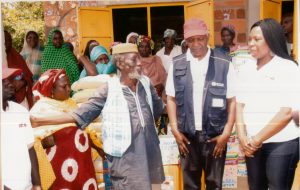Nigerian Government partners with the World Health Organization to improve healthy ageing
Abuja, 8 August, 2018 - Baba Idris Halilu Ibrahim is a retiree in in his late 70’s. A native of Gwoza local government area, Borno State, Baba Idris fled his hometown and relocated to Goza IDP camp in Abuja when terrorists attacked his village in August 2014.
“Since coming to Abuja, I thank God I have been able to access at least three meals a day and basic healthcare,” he says.
“I wonder what would have happened to me if I decided to remain in Gwoza like my fellow elderly friends,” he states tearfully.
According to the National Population Commission(NPC), Nigeria has approximately 9.3 million elderly people aged sixty years and above. The number of elderly people in Nigeria is high, yet little is known about interventions to improve their wellbeing and welfare.
The last policy on ageing in Nigeria was a draft developed in 2008 which requires a full overhaul and updating for adoption and approval. Currently, the Federal Government through the social welfare division of the Federal Ministry of Women Affairs and Social Director, and the Ministry of Health is partnering with WHO to review the national policy on ageing. It is anticipated that the policy will be fully reviewed and endorsed by Government by the end of August 2018.
Government interventions to improve healthy Ageing in Nigeria
“At the state level, some states in Nigeria such as Ekiti and Lagos state provide social security for the elderly, and give them some waivers on certain public services.” asserts Mrs Temitope Bamgboye, the Director of Social Welfare in the Ministry of Women Affairs and Social Development. “In addition, government has revitalised the National Pension Commission (PENCOM) and the Pension Transitional Arrangement Directorate (PTAD) to ensure that elders receive their entitlements faster than usual.”
On its part, the Ministry of health has made some recommendations on the ongoing ageing policy review. Some of the recommendations include: provision of mental health care services for the elderly, and putting structures in place to ensure senior Nigerian citizens are catered for across Nigeria.
Dr Christopher Ugboko, the Division Head of Gender, Adolescent/School Health and Elderly Care (GASHE) unit of the Federal Ministry of health stated that “the ministry is looking forward to having a policy on ageing in order to guide the different activities related to improving the wellbeing of the elderly in Nigeria, particularly, their physical and mental health.”
Healthy ageing as a tool for attainment of the SDGs
Healthy Ageing plays a pivotal role in the attainment of the Sustainable Development Goals (SDG) in the sense, that with improved policies on healthy ageing, poverty and hunger can be eradicated (SDG 1 and 2). In addition, improved healthy ageing will further foster good health and wellbeing (Goal 3), decent work and economic growth (SDG8), reduced inequality(SDG10), sustainable cities and communities (SDG11), and peace, justice and strong institutions(SDG16).
With the growing number of ageing people, there will be an increase in age-related non-communicable diseases (NCD) and thus there is a need to improve access to general healthcare and the creation of an enabling environment for the elderly.
Interventions by the World Health Organization
At the global level, the WHO has developed a global strategy and action plan on healthy ageing. It is estimated that in the next 50 years the demographic pyramid will change. Estimates indicate that there will be a higher population of elderly people than those under the age of five.
On its part, WHO Nigeria has been building capacities of programme managers in the Federal Ministry of Health, on subjects relating to ageing. It has also worked with several non-governmental organizations (NGOs) in creating awareness among the elderly on active and healthy ageing. In addition, Molme Foundation in collaboration WHO has provided free health care services and foodstuffs for the elderly living in the GOZA Internally displaced persons (IDP) Camp, elderly persons in Kuje settlement area Abuja, and in Gombe State.
Recently, WHO worked with the Dave Omokaro Foundation to produce a documentary showing the different profiles of elderly people in various communities in Nigeria. “The elderly feel neglected because they do not have health insurance, and they basically depend on support from their family members or well-wishers,” states Dr Andrew Mbewe, Family and Reproductive Health Cluster Lead, WHO Nigeria.
It is anticipated that the assentation of the National Senior Citizens Centre act (2018) the elderly will be provided with community-based care and support services in the areas of recreation, sports, health, housing, and finance as well as facilitating policy formulation on issues affecting senior citizens. This policy which is currently under review will further foster the attainment of activities listed in the National Senior Citizens Centre act.
Kindly follow us on Social Media:



